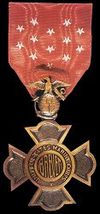Marine Corps Brevet Medal
| Marine Corps Brevet Medal | |
|---|---|

The Marine Corps Brevet Medal
|
|
| Awarded by Department of the Navy | |
| Type | Military decoration |
| Eligibility | Living Marine Corps officers who received brevet promotions |
| Awarded for | Extreme gallantry and risk of life in actual combat with an armed enemy force |
| Status | Obsolete |
| Statistics | |
| Established | 1921 |
| First awarded | Retroactively for actions in 1863 |
| Last awarded | Retroactively for actions in 1900 |
| Total awarded | 23 approved 20 awarded (3 approved recipients died before award) |
| Precedence | |
| Next (higher) | Medal of Honor |
| Next (lower) | Navy Cross |
|
Marine Corps Brevet Medal Ribbon |
|
The Marine Corps Brevet Medal, also known as the Brevet Medal, was a military decoration of the United States Marine Corps; it was created in 1921 as a result of Marine Corps Order Number 26. The decoration was a one-time issuance and retroactively recognized living Marine Corps officers who had received a brevet rank. The similar practice of frocking continues in all five branches of the U.S. Armed Forces..
Brevet promotions were used by the United States military in some capacity from 1775 until they were discontinued in 1900. The Army was the only branch authorized to grant brevets until 1814, when the Marine Corps was granted the same privilege. For the 86 years, the Marine Corps awarded 121 brevet promotions to 100 Marine Corps officers. Captain Anthony Gale was the first to receive a brevet promotion in 1814 and John Twiggs Myers, who died in 1952, was the last surviving recipient.
In 1921 Commandant John A. Lejeune requested that a Marine Corps Brevet Medal be authorized; after it was approved and created, the decoration was given to the last 20 living Marine Corps officers who received brevet promotions.
A brevet promotion or brevet is the advancement in rank without the advancement in either pay grade or position. Typically, a brevetted officer would be given the insignia of the brevetted rank, but not the pay or formal authority. Brevet promotions were originally authorized for the United States Army in 1775 by the Second Continental Congress. In 1778 a resolution was passed stating brevets would only be authorized "..to officers in the line or in case of very eminent services...".
The Marine Corps would not receive the authorization from Congress for brevet promotions until 1814 stating "... That the President is hereby authorized to confer brevet rank on such officers of the Marine Corps as shall distinguish themselves by gallant actions and meritorious conduct or shall have served ten years in any one grade...".
In 1814 Anthony Gale became the first Marine to receive a brevet promotion when he was brevetted to Major, having been a Captain for ten years. By the time the practice of brevet promotions was discontinued in 1900, 121 brevet promotions were bestowed on 100 Marine Corps officers.
...
Wikipedia
